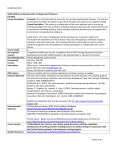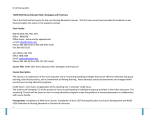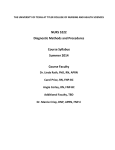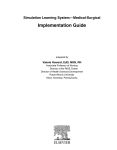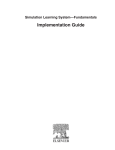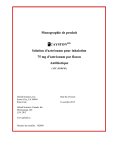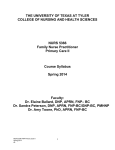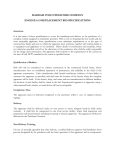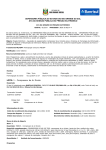Download 1 Welcome to NURS 5328: Evaluation in Nursing Education In this
Transcript
1 Welcome to NURS 5328: Evaluation in Nursing Education In this course we will examine the role of the nurse educator in the evaluation of learning. We look forward to joining you on this journey! Faculty Belinda Deal, RN, PhD, CNE, CEN Office: BRB 2350 Office Hours: online and by appointment Preferred method of communication, email or cell phone and text E‐mail: [email protected] Phone: 903‐530‐3787 (cell) office (903) 566‐7120 Fax: 903‐565‐5533 Jerri Post, PhD, RN Office: BRB 1100 Office Hours: Online and by appointment Preferred method of communication, email or cell phone and text Email: [email protected] Phone: 903‐306‐1288 (Home) 903‐566‐7017 (Office) Fax: 903‐565‐5533 If you experience any problems that you are not able to resolve by accessing the Information Technology Support Services at [email protected], you may contact your course faculty at the numbers listed above. Course Title: NURS 5328 Evaluation in Nursing Education Course Description: Assessment of theories and strategies of measurement and evaluation as they apply to nursing education. Combines theories of measurement and evaluation with outcomes based approaches to promote safe effective professional nursing practice. Experiential exercises in the development, use, and critique of measurement and evaluation methods to classroom and clinical learning situations as well as to nursing education program evaluation. Credit Hours: 3 Prerequisites: Completion of MSN Core Courses. Completion of Nurs 5327 Nursing Education Curriculum Development or Consent of Instructor. From a faculty standpoint, the “Big” purpose of this course is for graduate students to value the connection between course outcomes and course material and gain confidence in methods of assessing undergraduate nursing students in the classroom (mastering content as evidenced by passing exams) and in the clinical setting (demonstrating critical thinking by performing clinical behaviors). Active learning strategies and the faculty role will also be a focus. In other words: To equip graduate students to design, implement, and evaluate assessment in nursing education Fall,2014 Page1 2 Course Goals and Objectives Upon successful completion of the course, the student will able to: 1. Demonstrate the relationship between student learning outcomes and evaluation strategies. 2. Utilize appropriate instruments for various types of evaluative data 3. Analyze methods of evaluation of the student in the clinical practice area 4. Appraise methods of evaluation of the student in the classroom 5. Incorporate national standards in the development of program evaluation Textbook Information, Other Readings and Materials Oermann, M.H. (2015). Teaching in nursing: The guide to best practice. New York: Springer Publishing Company. ISBN: 9780826195531 McDonald, M. E. (2014). The nurse educator's guide to assessing learning outcomes. (3rd ed.). Sudberry, MA: Jones and Bartlett. Booklists and bookstore links may be accessed at the UT Tyler College of Nursing Graduate Studies page. Recommended resources Benner, P., Sutphen, M., Leonard, V., Day, L. (2010). Educating nurses: A call for radical transformation. San Francisco: Jossey‐Bass. Certified Nurse Educator (CNE) 2014 Candidate Handbook http://www.nln.org/certification/handbook/cne.pdf The Scope of Practice for Academic Nurse Educators 2012 Revision ISBN/ISSN: 9781934758175 (available on the NLN website cost approx. $20) Fall,2014 Page2 3 Course Outline Module I. Student Learning Outcomes and connection to course components Module II. Multiple Choice Item Exams Module III. Active learning strategies including Formative Assessment Module IV. Clinical Evaluation Module V. Faculty Role Week 1 2 3 4 5 Content Student Learning Outcomes Introduction to course KWL Chart Blooms and Fink Integration Student Learning Outcomes Multiple Choice Item Exams Readings in McDonald Multiple Choice Item Exams 6 Multiple Choice Item Exams NCLEX Criteria Multiple Choice Item Exams 7 Multiple Choice Item Exams 8 9 Multiple Choice Item Exams Multiple Choice Item Exams Reliability and Validity in MCI Exams Oct 27 Last day with withdraw with a “W” Active learning strategies including Formative Assessment 10 11 12 13 Active learning strategies including Formative Assessment Thanksgiving Holiday week 14 Faculty Role Portfolio End of Course Evaluations Clinical Evaluation Clinical Evaluation 15 Fall,2014 Page3 4 Course Calendar/Schedule The course calendar and schedule may be viewed by accessing the documents located in the Syllabus/Orientation folder titled Getting Started Grading Information and Course Requirements Final grades for the course will be determined based upon the following point assignments: A ‐ 90‐100 B ‐ 80‐89 C ‐ 70‐79 D ‐ 60‐69 F ‐ Below 60 Activity: Wk % or Weight: wk 2 5 Quick Reference MCI /including DB activities wk 3,4 15 Teaching strategy Tool Box DB wk 11 10 3 page paper on Clinical evaluation strategies wk 12 10 Develop one clinical scenario collaboratively wk 13 5 Group Activities Bloom/SLO quiz/worksheet Individual KWL Chart DB wk 1 5 MCIs and Revisions wk 5 10 MCI with NCLEX criteria wk 6,7 10 Reflection faculty role in MCIs wk 8 5 MCI Exams statistical criteria worksheet/quiz wk 9 5 Teaching strategy report DB wk 10 5 Reflection on nurse educator wk 14 5 Peer evaluation grade wk 14 5 Portfolio completion wk 14 5 100% Grading criteria will be posted in the Assignments Area Five (5) points will be deducted for each day an assignment is late (including weekends) if prior Fall,2014 Page4 5 arrangements have not been made with the course instructors. Reading Assignments Assigned readings in graduate education are the beginning, not the endpoint. These readings will point you in the direction of continued reading and pondering of your scholarly thoughts. Each participant is responsible for completing the reading assignments in a timely manner. Deadlines are listed in the Course Schedule. Discussion and written assignments are made with the assumption that required reading assignments are completed prior to completion of discussion and written assignments. Course Participation/Discussion Board Assignments A Rubric for how postings will be graded is provided in the next section of this Syllabus. Each participant is responsible for participating in the asynchronous discussions of each Module. This participation will include posting answers to questions posed by the instructor and replying to other participants' postings. Participants should plan on entering the Discussion area several times a week in order to read and comment on others postings. Posting answers to the questions posed in the Discussion area should be done in advance of the deadline in order to allow other participants to have the opportunity to comment. Quality of answers is as important as quantity. A participant's comments should add to the discussion. Comments should be supported as required with references cited appropriately. Fall,2014 Page5 6 Discussion Board Postings ‐ Grading Criteria The purpose of the discussion board in an online graduate program is to take the place of the class interchange that would occur in a face‐to‐ face class. It is your opportunity to demonstrate your mastery of the assigned readings and your ability to supplement those readings with expanded exposure to related (and sometimes contrary) information that you will seek as you begin to understand and be informed. So, we will expect you to share ideas you have gained from the literature, noting the source when appropriate and interpreting into your own words. We will also expect that you will use a more complex thought process to dissect and analyze what you read in the literature and in the discussion thoughts of your fellow students as you offer your own insights.. The following includes guidelines and allow you to see thinking process we will use to assign a grade to the discussion board exercises. CRITERIA/PO INTS Format and logical progression of posting <80 80‐89 90‐100 Spelling and grammar errors (more than 2) detract from the substance of the posting; random thoughts with no sense of a plan to reach a logical conclusion. No clear main idea or direction for flow of information. Few (2 or less) spelling and grammar errors, form is basic but easy to follow Form is superior; obvious attention to proofreading and grammar. Main idea is stated early and clearly; argument or ideas are built using a logical progression of thoughts stated clearly and succinctly. Depth and relevance of post to the topic at hand Posting shows superficial thinking based on personal experiences or opinions only, there is little consideration of contributions to the topic in the literature or from colleagues. Literature support is not relevant to the topic or major literature contributions are missing. Post strays from topic with much irrelevant information and does not address the intent of the assignment. No references cited Basic idea is presented, reflects some critical thinking, correct and fairly well stated, one reference cited Posting clearly shows evidence of critical thinking and analysis expected of a graduate student. Ideas offered are relevant to the topic and show the ability to extrapolate complex ideas from various sources into a coherent argument or statement(s). Two or more relevant references cited; cited references are appropriate and indicative of the best knowledge on the topic. Application to the teaching role Posting is largely aimed at self‐expression without consideration of the reader. There is no room for dialogue or disagreement and no acknowledgment of the potential contributions of others. The posting is a rehash of old ideas without consideration of how these can advise the future. No evidence is found of making the material consumable or reader‐friendly Posting considers the reader and may include new information but discussion not in depth Posting shows an astute awareness of the needs of a potential faculty member with an interest in growth and knowledge acquisition; attempts to move colleagues into meaningful dialogue and presents creative approaches that are open to discussion. Post contributes to the scholarly community, presented in a clear, enlightening, and engaging way. Fall,2014 Page6 7 Written Assignments All written assignments are to be completed in Microsoft Word and submitted in a timely manner. Deadlines are listed in the Course Schedule. Please note that all written assignments must be submitted by midnight Central Standard Time on the due date. All written assignments should be submitted through the assignment links. If your web connection is down for some reason, please contact your instructor to make arrangements to get the assignment submitted within the posted time period. Plagiarism is a serious academic offense. Please avoid the consequences of academic dishonesty by citing all sources that you use in your work. Email: To communicate by email within the course with other participants or all participants, click the Communication link on the left side of the Blackboard frame. Click Send E‐mail to send a message. You have the option to send messages to All Users or Select Users in the course, including the instructor(s). If you need further instructions on how to send email messages from within Blackboard please read the User Manual located in the Tools area of the course. Course Discussions There will be a main discussion board thread for general questions. But you will be assigned to a small group for group activities. When you open your BBD course, your group should be in the left lower corner under the menu items. Check the Discussions section often. Since the discussion is asynchronous, other responses will be submitted after your post. Be sure to check the Discussions section each time you log into the course to view any added material and respond to your colleagues’ comments. Digital Library Resources You will also utilize the Robert R. Muntz Library, at the University of Texas at Tyler. Many of the database subscriptions funded by student fees give you access to full text journals that you will need for your review of the literature in each course. Please take the time to set up your account and get familiar with the resources available. They are awesome. University Policies: Students Rights and Responsibilities To know and understand the policies that affect your rights and responsibilities as a student at UT Tyler, please follow this link: http://www.uttyler.edu/academicaffairs/syllabuspolicies.pdf Plug‐ins and Helper Applications UT Tyler online courses use Java, JavaScript, browser plug‐ins, helper application and cookies. It is essential that you have these elements installed and enabled in your web browser for optimal viewing of the content and functions of your online course. Adobe Reader allows you to view, save, and print Portable Document Format (PDF) files. http://get.adobe.com/reader/ Fall,2014 Page7 8 Java Runtime Environment (JRE) allows you to use interactive tools on the web. http://www.java.com/en/download/ Adobe Flash Player allows you to view content created with Flash such as interactive web applications and animations. http://get.adobe.com/flashplayer/ QuickTime allows users to play back audio and video files. http://www.apple.com/quicktime/download/ University Policies Students Rights and Responsibilities To know and understand the policies that affect your rights and responsibilities as a student at UT Tyler, please follow this link: http://www2.uttyler.edu/wellness/rightsresponsibilities.php Grade Replacement/Forgiveness and Census Date Policies Students repeating a course for grade forgiveness (grade replacement) must file a Grade Replacement Contract with the Enrollment Services Center (ADM 230) on or before the Census Date of the semester in which the course will be repeated. Grade Replacement Contracts are available in the Enrollment Services Center or at http://www.uttyler.edu/registrar. Each semester’s Census Date can be found on the Contract itself, on the Academic Calendar, or in the information pamphlets published each semester by the Office of the Registrar. Failure to file a Grade Replacement Contract will result in both the original and repeated grade being used to calculate your overall grade point average. Undergraduates are eligible to exercise grade replacement for only three course repeats during their career at UT Tyler; graduates are eligible for two grade replacements. Full policy details are printed on each Grade Replacement Contract. The Census Date is the deadline for many forms and enrollment actions that students need to be aware of. These include: Submitting Grade Replacement Contracts, Transient Forms, requests to withhold directory information, approvals for taking courses as Audit, Pass/Fail or Credit/No Credit. Receiving 100% refunds for partial withdrawals. (There is no refund for these after the Census Date) Schedule adjustments (section changes, adding a new class, dropping without a “W” grade) Being reinstated or re‐enrolled in classes after being dropped for non‐payment Completing the process for tuition exemptions or waivers through Financial Aid Last Day to Drop Any or All Classes Fall 2014 October 27 (drop date) Courses may be dropped online through myUTTyler until 4 p.m. on the last day of online (early) registration. After that time, all drops and/or withdrawals must be completed through the Registrar’s Office, either in person, by fax or by mail. Faxed or mailed drop/withdrawal requests must include the student’s name, ID number, course(s) to be dropped, date, student’s signature, contact phone number and copy of a photo ID (driver’s license, student ID, etc.). Requests should be mailed to UT Tyler Registrar’s Office, 3900 Fall,2014 Page8 9 University Blvd, Tyler, TX 75799 or faxed to (903)565‐5705. Students are advised to meet with their instructor(s) and/or academic advisor prior to dropping any classes. Dropping or withdrawing from classes may affect financial aid eligibility, veteran’s benefits, athletic eligibility, or international student status. Students should consult with those departments prior to dropping or withdrawing. State‐Mandated Course Drop Policy Texas law prohibits a student who began college for the first time in Fall 2007 or thereafter from dropping more than six courses during their entire undergraduate career. This includes courses dropped at another 2‐year or 4‐year Texas public college or university. For purposes of this rule, a dropped course is any course that is dropped after the census date (See Academic Calendar for the specific date). Exceptions to the 6‐drop rule may be found in the catalog. Petitions for exemptions must be submitted to the Enrollment Services Center and must be accompanied by documentation of the extenuating circumstance. Please contact the Enrollment Services Center if you have any questions. Disability Services In accordance with Section 504 of the Rehabilitation Act, Americans with Disabilities Act (ADA) and the ADA Amendments Act (ADAAA) the University offers accommodations to students with learning, physical and/or psychiatric disabilities. If you have a disability, including non‐visible disabilities such as chronic diseases, learning disabilities, head injury, PTSD or ADHD, or you have a history of modifications or accommodations in a previous educational environment you are encouraged to contact the Student Accessibility and Resources office and schedule an interview with the Accessibility Case Manager/ADA Coordinator, Cynthia Lowery Staples. If you are unsure if the above criteria applies to you, but have questions or concerns please contact the SAR office. For more information or to set up an appointment please visit the SAR office located in the University Center, Room 3150 or call 903.566.7079. You may also send an email to [email protected] Student Absence due to Religious Observance Students who anticipate being absent from class due to a religious observance are requested to inform the instructor of such absences by the second class meeting of the semester. Student Absence for University‐Sponsored Events and Activities If you intend to be absent for a university‐sponsored event or activity, you (or the event sponsor) must notify the instructor at least two weeks prior to the date of the planned absence. At that time the instructor will set a date and time when make‐up assignments will be completed. Social Security and FERPA Statement: It is the policy of The University of Texas at Tyler to protect the confidential nature of social security numbers. The University has changed its computer programming so that all students have an identification number. The electronic transmission of grades (e.g., via e‐mail) risks violation of the Family Educational Rights and Privacy Act; grades will not be transmitted electronically. Emergency Exits and Evacuation: Everyone is required to exit the building when a fire alarm goes off. Follow your instructor’s directions regarding the appropriate exit. If you require assistance during an evacuation, inform your instructor in the first week of class. Do not re‐enter the building unless given permission by University Police, Fire department, or Fire Prevention Services. Fall,2014 Page9 10 Course Evaluation UT Tyler may ask you to complete a voluntary evaluation to help them make improvements and adjustments in their overall online learning forums. Also, an end of semester evaluation specifically for this course will be made available for you to complete in the last week of instruction. Your comments and recommendations will be considered seriously as the course is updated. Your input throughout the semester contributes to our commitment to improve continually the quality and relevance of this course. Netiquette Guide "Netiquette" is network etiquette, the do's and don'ts of online communication. Netiquette covers both common courtesy online and informal "rules of the road" of cyberspace. Review and familiarize yourself with the guidelines provided. Completion Time You should expect to spend as much time on an online course as you do in a face‐to‐face course. As a rough guide, you should plan to spend six to ten hours per week on this course. The actual amount of time will vary from individual to individual. This estimate includes the time you spend in reading, discussions, and assignments. All assignments have set due dates. Due dates are as of midnight Central Standard Time on that date. Academic Dishonesty Policy Academic dishonesty, such as unauthorized collusion, plagiarism and cheating, as outlined in the Handbook of Operating Procedures, University of Texas at Tyler, will not be tolerated. University regulations require the instructor to report all suspected cases of academic dishonesty to the Dean of Students for disciplinary action. In the event disciplinary measures are imposed on the student, it becomes part of the students’ official school records. Also, please note that the handbook obligates you to report all observed cases of academic dishonesty to the instructor. Please understand that the online technology that has so greatly enhanced our ability to find and use other people’s words has also made it much easier to track and discover those who do. Fall,2014 Page10










